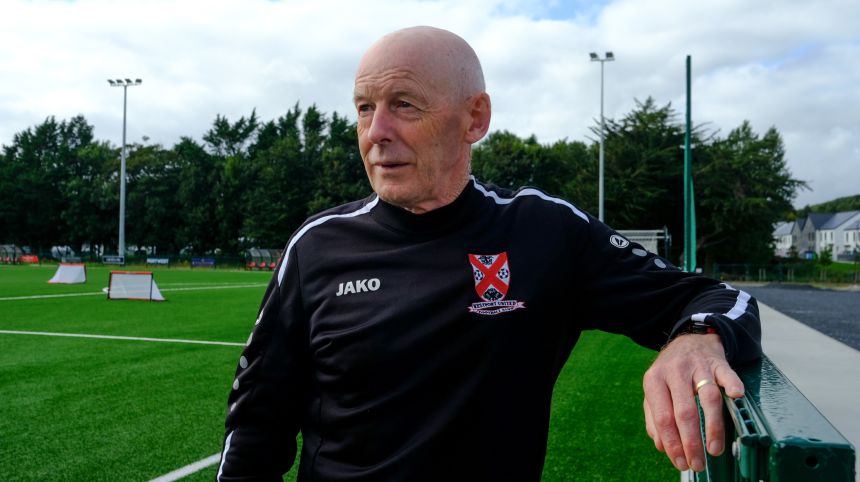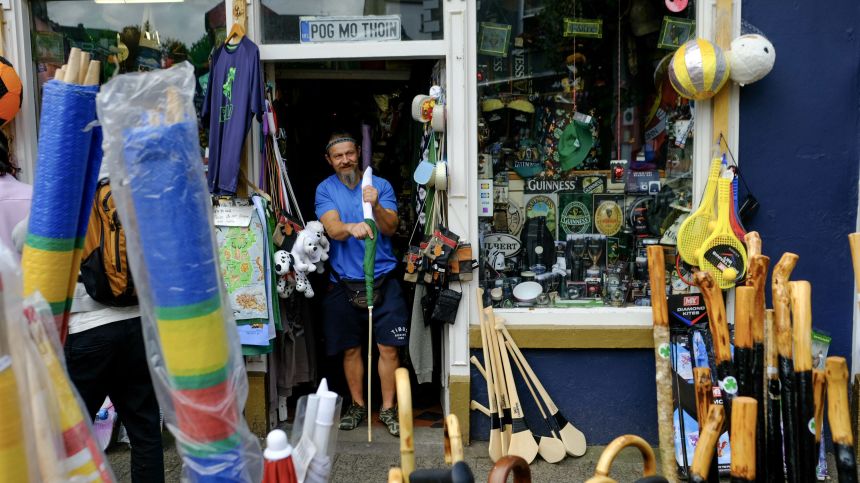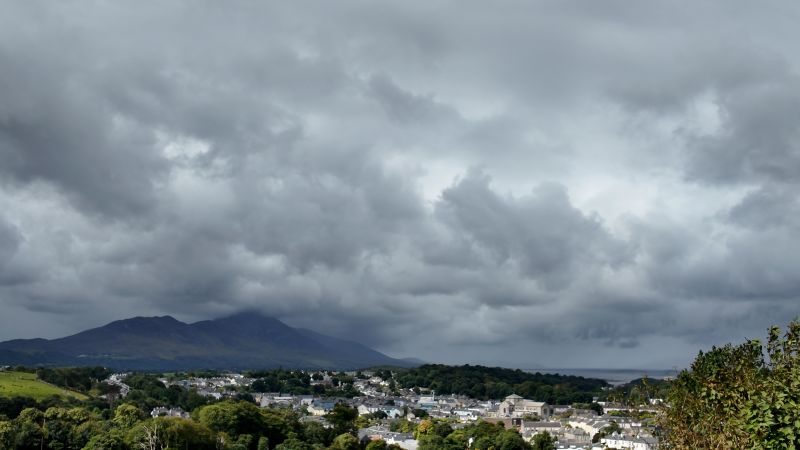Westport, Ireland
—
In ancient Celtic folklore, Tír na nÓg is the land of eternal youth, where time stands still and people don’t age.
Today, in the west of Ireland, they’ve come close to bottling it.
Westport, a small coastal town in picturesque County Mayo, is the unlikely nerve center of the world’s Botox supply. A facility operated by the Chicago-based pharmaceutical company AbbVie employs at least 1,300 local people and about 500 additional contractors – an economic backbone to a town of barely 7,000 people.
Therapeutic Botox – used for conditions that include muscle spasticity, migraines, overactive bladders, certain eye conditions and excessive sweating – brought in $3.3 billion for AbbVie last year, with sales of cosmetic Botox, often used to smooth facial wrinkles, generating $2.72 billion.
But last week, US President Donald Trump took a step toward his goal of bringing that multi-billion-dollar industry home, announcing 15% tariffs on all pharmaceutical exports from the European Union.
It’s a move that some fear could devastate towns like Westport, which has been transformed by the plant, from its opening by Allergan in 1977 to its acquisition and expansion in 2020 by AbbVie.
Inside the sprawling 61-acre campus – a sleek industrial presence nestled below Croagh Patrick, one of the country’s most storied pilgrimage sites – vials of Botox are processed and packaged in powder form, before export to some 70 countries, according to industry estimates.
The US tops the list, accounting for 70% of total turnover at the Westport plant, which also makes eyecare products, according to the company’s 2023 filings.
Uncertainty about how the tariffs will impact the company has created anxiety for some in Westport, a community where the long-term benefits of the plant’s presence cannot be overstated. It’s embedded in the community, powering everything from infrastructure to sports teams and local charities.
At AbbVie United Park, the home ground for the Westport United soccer club, where many of the company’s workers and their families gather to train or cheer from the sidelines, locals said the tariffs could have a significant impact.
No employee of AbbVie would speak on the record with CNN. But daycare center owner Anne-Marie, who chose not to give her surname for privacy reasons, said she had heard many parents who work at the plant – and leave their children in her care – voice anxiety about what could lie ahead.
“They are worried about their jobs, they just don’t know how it’s going to go. Is it going to affect them? Are they going to have a job this time next year? Is the company going to be able to keep going?” she said.
“And it’ll have a knock-on effect for me, you know,” she said, adding: “If they don’t have a job, I won’t have a job.”
Brian Cusack, from the soccer club’s development committee, was generally more upbeat about the future but believes “a lot of change is going to happen, and maybe not change for the good.”
“Westport doesn’t know what it’s like without an American pharmaceutical treatment place. And I don’t think we’d like to find out what it looks like without it,” said Cusack, whose 25-year-old daughter also works at the plant.

Last month, after weeks of uncertainty, the US-EU trade deal was finally agreed upon. While some in Ireland and the wider bloc welcomed the agreement, other European leaders considered it an exercise in damage limitation. The calm after its announcement was to be short-lived.
Singling out Ireland – the world’s third-largest pharma exporter and home to pharma giants Johnson & Johnson and Pfizer – Trump said last Tuesday that upcoming tariffs on imported pharmaceuticals could reach 250% over the next 18 months. The threat comes as the US is currently conducting a Section 232 investigation into whether foreign drugs threaten national security, a process whose outcome could override the current US-EU trade deal.
“We want pharmaceuticals made in our country,” he said.
But tariffs alone aren’t likely to spark a mass move. While the idea of bringing pharmaceutical manufacturing back to the US resonates with Trump’s base, putting it into practice is fraught with challenges.
Experts say that while some drug production may shift to existing US facilities, full-scale reshoring is unlikely due to high costs, regulatory hurdles, supply chain challenges, and the long timelines for building or relocating high-tech plants – delays that could outlast any political changes.
Anne-Marie suggested that the US president’s moves could be purely political but said they have still managed to sow widespread concern.
Still, she pointed to the resilience of the town – and Ireland – expressing the belief that Westport’s industry will be able to outlast his administration.
“When he goes out of power, it’s just gonna all change again – like it did the last time,” she said, referring to Trump’s first term in office and noting that people’s lives can’t be dictated by what she characterized as the whims of one man.
It’s an attitude that is felt around the town.
As traffic buzzed through the area, Mayo councillor Peter Flynn told CNN that while the tariffs have created “a real headache,” people there are “getting on with their lives.”

Flynn, who worked at Allergan for nearly three decades, said that Trump’s push to quickly bring manufacturing to the US was unrealistic.
“This kind of ‘lift and shift’ approach that Donald Trump is talking about – it’s nonsensical,” he said. He argues that moving operations is extremely difficult, even domestically—let alone overseas—because of the gross logistical challenges it brings, let alone the skilled workers it requires, many of whom he says are now leaving the US “at speed.”
Plus, he added, “anyone that’s considering a location to move to – be it India or some of these other locations where a lot of graduates come from – are now taking the US off their map.”
AbbVie, which declined to speak with CNN for this story, has not signaled any plans to move its Botox production hub.
Addressing the tariffs in a recent public earnings call, AbbVie president Robert A. Michael said that the company was “having constructive discussions with the administration on sectoral tariffs,” and noted that it will “obviously continue to invest in the US.” On Tuesday, the company announced a $195 million investment in its Chicago manufacturing plant, in what it said was part of a broader commitment to invest more than $10 billion in US projects over the next decade.
Other major drugmakers have also announced that they’ll be scaling up American investment in response to the new tariffs.
What these investments might mean for Ireland is unclear.
But it’s possibly not great news. Last year, pharmaceuticals made up €44 billion ($51.2 billion) of Ireland’s total €72.6 billion ($84.5 billion) of exports to the US.
Ahead of the tariff deal, Ireland appeared to proactively fast-track exports: €20 billion ($23 billion) worth of pharma goods were shipped to the US in the first two months of this year, according to official trade data.
And while a trade war appears to have been averted for now, American consumers could be at the receiving end of soaring drug costs.
ING analyst Diederik Stadig told CNN that a 15% tariff could increase US drug prices by 7% to 10%, adding up to $13 billion annually to health care costs. Consumers could shoulder the burden over time through higher health insurance premiums and increased drug prices at pharmacies.
For products like cosmetic Botox, which isn’t covered by US health insurance, the costs of procedures already considered a luxury could also rise, analysts say, putting a further strain on wallets.
That’s of concern to Westport hotelier Michael Lennon, whose US clientele are key to the tourism industry.

Driving to pick up his American guests, who were horse riding at a nearby beach on Clew Bay, where he runs an equestrian trekking outfit, Lennon said he wasn’t so worried about the Westport plant taking a hit.
“There’s innovative thinking in every one of our businesses… and I think we’ll adapt,” Lennon said, as his jeep rattled along the Wild Atlantic Way, a scenic route along the country’s rugged coast.
“My worry would be that it (the increase in tariffs) could upset the American economy, and we need all these Americans coming to Ireland.”
He then recalled a conversation he had with a Trump-supporting guest, who told him: “What’s good for America is good for Ireland.”
Lennon said he hopes that’s true.
“But I don’t know. And neither does she,” he said.
